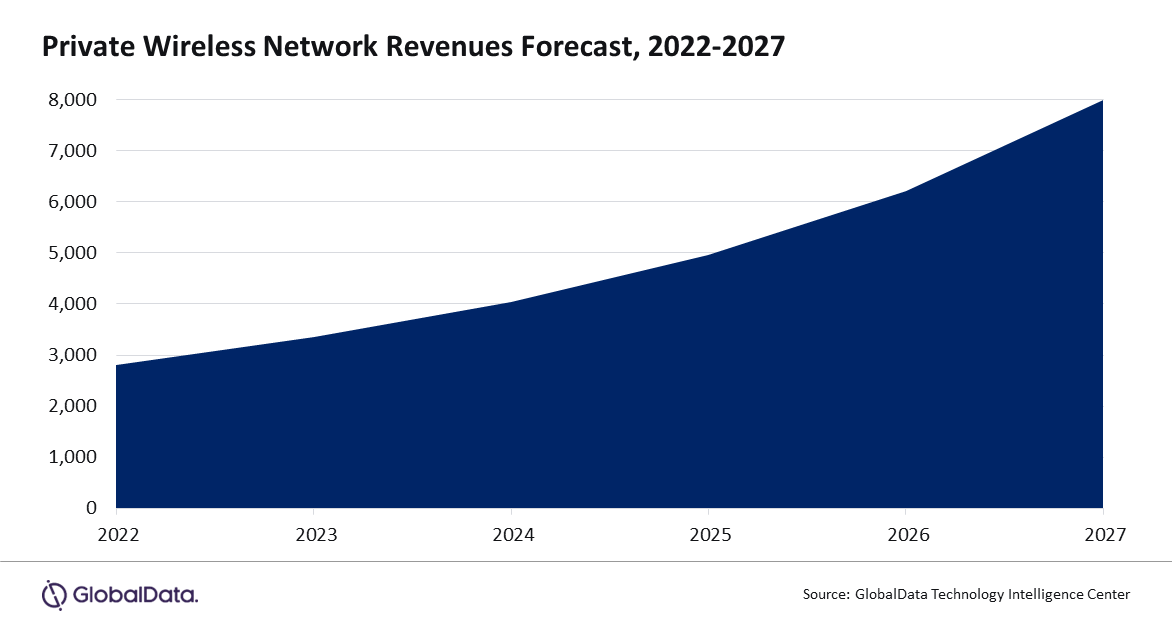The global private wireless network market is on the cusp of substantial growth, driven by the escalating demand for reliable and secure wireless connectivity across various industries. Against this backdrop, the market is set to grow at a compound annual growth rate (CAGR) of 23.3% from $2.8 billion in 2022 to $7.9 billion in 2027, forecasts GlobalData, a leading data and analytics company
RELATED: 5G Fixed Wireless Access to generate $2.5b globally by 2023; 480% growth in 12 mths
GlobalData’s latest report, “Private Wireless Networks Market Opportunity Forecasts by Geography, Technology Segments and Industry Verticals to 2027,” reveals that the US emerged as the largest market for private wireless networks in 2022, capturing 21% of the total revenue share, followed by China at 11%. Furthermore, the US is expected to record the highest growth rate with a CAGR of 30.6% over the forecast period, with Germany and the UK following closely at CAGRs of 26.4% and 26.2%, respectively.
The early availability of spectrum for private cellular networks has been a key driver behind the growth of the private wireless network market in these countries. In Europe, there is a strong emphasis on industry automation and smart factories, which is fueling the growing adoption of private wireless networks in a number of sectors.
Rohit Sharma, Lead Analyst at GlobalData, comments: “Businesses are increasingly adopting private wireless networks, recognizing the importance of dependable and secure connectivity in the age of increasingly connected business operations and the proliferation of the industrial Internet of Things (IoT). This surge is enabled by the rollout of 5G technology by major industry players including availability of flexible solutions designed for use in private enterprise networks.”

GlobalData highlights manufacturing, mining, utilities, and government as the key verticals for private wireless network market, which collectively accounted for 51.3% of the overall market in 2022. The rollout of devices supporting 5.5G technology starting in 2025 is set to enhance 5G private networks significantly. This advancement will unlock a plethora of new device capabilities, harnessing advanced features like NR-Light (Redcap) and expanded side link functionality.
John Marcus, Senior Principal Analyst at GlobalData, explains: “The convergence of operational technologies (OT) with IT systems in the manufacturing industry is further bolstering the adoption of private wireless networks as it requires a robust and reliable communications infrastructure. Private 5G networks will accelerate this integration with their ability to provide ultra-reliable, low-latency communications to enable real-time automation of industrial processes.”
Additionally, innovations in indoor/outdoor positioning techniques and passive IoT tag technology will further amplify the potential of these networks. These groundbreaking developments are poised to facilitate the emergence of novel applications and foster growth in sectors such as manufacturing, energy, and utilities, where sensitive data and critical operations require a high level of protection and will benefit greatly from the ability of private wireless networks to provide enhanced security and control over the network.
Sharma continues: “With the evolving use cases in industrial IoT, traditional LAN/WiFi connectivity can often have limitations in coverage and stability. Private 4G/5G wireless provides consistently stable connections using fewer access points, increasing performance for connected devices on an organization’s premises whether the devices move around the campus or are fixed in one location. Digital twins, computer vision, autonomous vehicles/drones, and AR/VR-assisted applications will all benefit from the private wireless connectivity integrated with edge computing for local data processing.”
Marcus concludes: “As organizations continue to embrace their digital transformation, private wireless networks are positioned to become the fundamental element of future operations, enabling seamless connectivity and empowering industries to innovate and thrive. With the ongoing technological advancements, robust security measures, and a growing demand for IoT solutions, the private wireless network market is on a strong growth trajectory which is reshaping the future of wireless enterprise connectivity.”

































